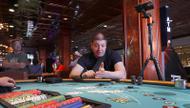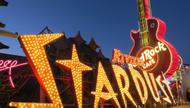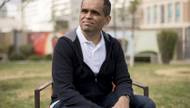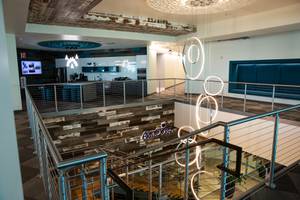At 29, Amanda Slavin has worked in media, hospitality and events, earned a master’s in education and founded a company (she wasn’t among Forbes’ 30 Under 30 for nothing). But instead of focusing on any one of those interests, Slavin has rolled them all into CatalystCreativ, a socially conscious marketing firm that organizes interactive events for brands such as NPR, Dell, the Global Ocean Commission and Coca-Cola. Locally, Slavin and her remote, eight-person team put on Catalyst Week, an inspirational speaker series for Downtown Project that’s brought in names such as Slava Rubin, founder of Indiegogo, and Glee’s Harry Shum Jr. This month, CatalystCreativ will launch an app, a “Tinder for passions and expertise,” that connects career people based on their interests.
The Weekly caught up with Slavin to talk about why intention matters in modern marketing, and just how much money millennials spend.
CatalystCreativ focuses on community design. What does that mean? Community design we now consider a service, as opposed to what we are. We’ve recoined ourselves an “experience studio.” Community design to us is engaging—we focus mainly on millennials—and so, we say, “How can we create experiences to engage millennials around your brand?” That usually means inspirational experiences on- and offline. Millennials really want authenticity and they don’t want something fake, or something shoved in their face. They want to be a part of something that’s bigger than themselves and they want to feel heard.
Why millennials? We focus on millennials and Generation Z, which is the next generation coming up. Millennials, by 2017, will be spending $200 billion per year. By the end of our lifetime, we’ll spend $10 trillion. Millennials is really where the buying power is, and it’s the future. Millennials and Generation Z want to change the world. The generations before us aren’t really in the same mind-set.
What are your favorite experiences you’ve created? I love what we just did for Starwood and Ekocycle for W Hotels. Ekocycle is Coca-Cola’s sustainability initiative. They take Coca-Cola bottles and turn them into other products like Beats by Dre headphones or Adidas sneakers. Will.i.am actually started it with Coca-Cola. It’s Ekocycle, so it’s Coke spelled backwards and then “recycle.” We helped launch this partnership to create sustainable, recyclable sheets for the property. It was a 200-person experience in New York City. We had a photobooth that was a bed with two pillows. We had vignettes where actors acted out experiences like “what would you do in a bed?”—the PG version. We showcased what it looked like to turn bottles into sheets, behind the bar.
How do you decide what to do for each event? We start with why. We asked clients, “Why are you doing this? What are you looking to achieve?” I have a master’s in education, but then I was in hospitality for five years, in marketing and events. We combined the two to help brands tell their stories through building a curriculum. We say, “What’s the message? What’s the objective? What’s the body of this experience? Who’s going to be providing that message?”
How did you come up with your current job? I went from teaching to hospitality, and I was knee-deep in nightlife and events and marketing in New York City. I was doing a lot of events that didn’t fit with my teacher side. And so I met Tony Hsieh at a conference that I was working at, and he invited me to come to Downtown Vegas about three years ago. He didn’t remember inviting me out; it was really awkward. Then he asked me, “Why don’t we meet up at the Beat and you can tell me who you are and what you want to do with your life?” All I knew was that, from the time I went to that conference with all these remarkable entrepreneurs doing all these amazing things, to the time I met Tony in Vegas, I was trying to figure out how to use what I know, which is education and hospitality, but for good. I wasn’t invited to these TED-like conferences; I was working them. So I said, “How do I provide more opportunities to people like me that can’t necessarily afford TED or will never be invited to TED because it’s the 1 percent ... and provide that to as many people as possible over and over again?” That’s how Catalyst Week started.
How have you made a difference in the world? What are you really proud of? We had a longtime local stand up during Catalyst Week recently and say, “I wanna just tell you that this is what I’ve been waiting for.” That was one of the most unbelievable moments. This is why I’m doing what I’m doing. We get testimonials from people who say, “I left my job and have such a better life!” or “I met the love of my life!” That is so unbelievable. If we can inspire just one person then we’re doing something right.








